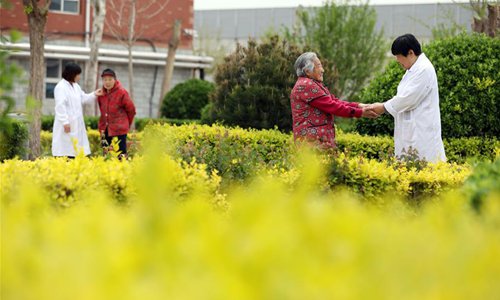
Elderly citizens are accompanied by medical care personnels at an elderly care center in Taocheng District of Hengshui City, north China's Hebei Province, May 5, 2019. Chinese economy is transitioning from high-speed growth to high-quality development. (Photo: Xinhua)
Several deputies to the 14th National People's Congress (NPC) and members of the 14th Chinese People's Political Consultative Conference (CPPCC) National Committee have been focused on the issue of the aging population at the just-concluded two sessions, with some calling for efforts to formulate long-term care insurance for seniors at a national level with unified standards in order to further improve elderly-care services across the country.
China should establish a long-term care insurance system as soon as possible to tackle the problems caused by an increasing aging population and social security pressure, according to one motion that Lu Xiaoming, a CPPCC National Committee member, sent to the Global Times on Monday. Lu submitted two motions at the two sessions, both relating to elderly-care services.
Lu, who is also deputy director of the law school at Guangdong University of Finance and Economics, said in his motions that developing long-term care insurance to provide support for families in difficulties is becoming increasingly urgent. Lu suggested that a multi-tiered social security system should be managed at a national level to formulate long-term care insurance policies and standards, and he added that a diversified financing mechanism should be established.
China has been exploring long-term care insurance since 2016. In June that year, China released a guideline on a long-term care insurance program in 15 pilot cities including Shanghai, Guangzhou, South China's Guangdong Province and Chengdu, Southwest China's Sichuan Province, according to China's Ministry of Human Resources and Social Security.
However, the further development of long-term care insurance has been restricted due to the lack of a long-term care system at a unified national level, Lu said.
There is more room to improve the system. For instance, the long-term care insurance does not cover all residents under the insurance system and the information related to financing mechanism needs to be further clarified, according to a motion submitted by NPC deputy Cheng Ping.
A long-term care insurance system covering all citizens should be established as soon as possible at the national level, Cheng said.
Some other NPC deputies also submitted suggestions on expanding the coverage scope, increasing financing channels, improving the evaluation system and other sections relating to the long-term care insurance system.
By the end of 2022, China's population aged 60 or above reached 280 million, accounting for 19.8 percent of the total population, data released by the National Bureau of Statistics on February 28 showed.
China has vowed to improve the elderly care work mechanism to implement the proactive national strategy in response to the issue of aging population and to expand basic elderly-care services to cover all senior citizens, according to China's State Council institution reform plan,
which was approved by the national legislature on Friday.
Global Times




